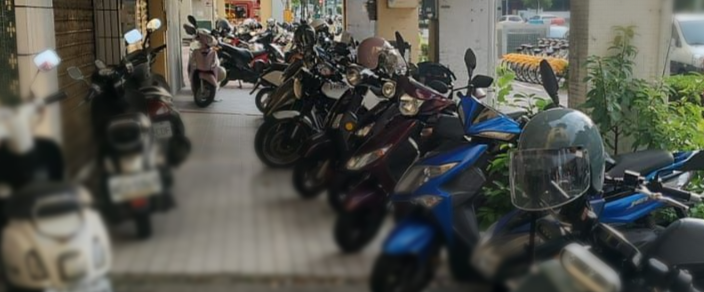Discover Formosa - Beautiful Island
Taiwan's Scooter Culture: Ease for Riders, Chaos for Pedestrians.

As you walk or cycle through the streets of Taiwan today, you might frequently sense the pressure of being pushed aside. In 2022, reports indicated that more than 375,000 traffic accidents took place throughout the island, leading to nearly 2,000 fatalities among scooter riders and around 394 pedestrian deaths. These figures highlight the significant dangers linked to walking. In 2024 alone, nearly three thousand individuals lost their lives in traffic incidents.
Designated sidewalks often find themselves compromised. In many cities across Taiwan, sidewalks are always blocked. Scooters frequently occupy the entire width of sidewalks or spill into pedestrian crossings. Additionally, makeshift storefronts and vendor stalls further crowd the walkways, with many shop owners expanding their displays directly onto pedestrian paths using racks, boxes, or signs. This forces pedestrians off the sidewalks to dodge parked scooters or merchandise, and they often find themselves walking on the road. Cyclists encounter parallel issues where bike lanes may exist but are often abruptly interrupted or obstructed, compelling them to merge into mixed traffic. Safety becomes a significant concern, particularly at night or during busy traffic hours.
Policing resources are stretched thin, and despite their enforcement efforts, it remains impossible to monitor the multitude of scooters and cars on sidewalks and roads. Ultimately, the responsibility rests on scooter users to be considerate of others, though that can often be easier said than done. It's a classic case of doing to other what you do not want do to you.
The Greater Taipei area is home to more than 3.2 million registered scooters, constituting nearly 85% of all traffic-related injuries and fatalities within the region. As of May 2025, Taiwan has about 15 million registered scooters, resulting in a scooter density of approximately 375 per square kilometer. This makes Taiwan one of the most scooter-dense countries in the world, mirroring the scooter density seen in Indonesia, Vietnam, and the Philippines.
In contrast, countries such as Japan and Singapore illustrate how enforcement can significantly alter the urban landscape. For example, in Singapore, scooters and motorcycles are subject to stringent regulations, resulting in safety for pedestrians. Riders are only permitted to park in designated motorcycle areas, facing hefty fines for obstructing sidewalks or pavements. Consistent enforcement through electronic systems and municipal patrols ensures that footpaths remain clear for pedestrians. Sidewalks are regarded as essential public spaces, safeguarding pedestrians from having to step onto busy roads. Singapore’s model demonstrates how well-defined rules and steadfast enforcement can lead to safer, more livable streets for all. In Japan, many cities implement strict parking regulations, contributing to more secure sidewalks. Even smaller municipalities uphold clear policies against encroachment by vehicles or vendors, ensuring that pavements are honored. This stands in stark contrast to Taiwan, where scooters often overflow onto walkways, and makeshift stalls, rubbish and storage impede pedestrian movement, forcing individuals to navigate through traffic at their own peril.
Navigating Taiwan streets feels like an obstacle course, with visibility obstructed, uneven pathways, and heightened safety risks, particularly during early morning or evening hours. Crossing streets becomes hazardous when scooter traffic fails to yield. While rules exist to protect pedestrians, both enforcement and design often fall short. The numbers are alarming: in the first quarter of 2024, there was a 15.5% increase in pedestrian fatalities compared to the same period the previous year.
In Taiwan, both cyclists and pedestrians quickly realize that scooters, street vendors, parked cars, and obstructed sidewalks form a complex maze of challenges, presenting real daily safety concerns for foreigners unaccustomed to navigating such an environment.
Allow us to guide you through your Taiwan journey with experience, clarity, and care. Reach out to us by email: hosana.question@gmail.com,
or utilize our site’s request contact form to claim your free complimentary consulting service!
Contact us here: https://www.hosana-solutions.com/contact





